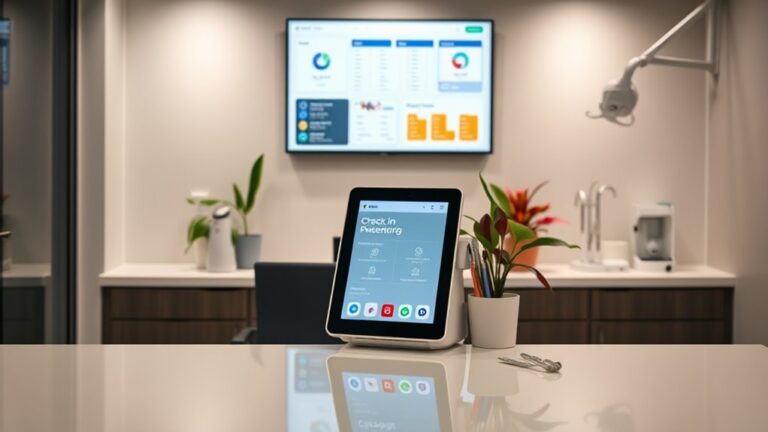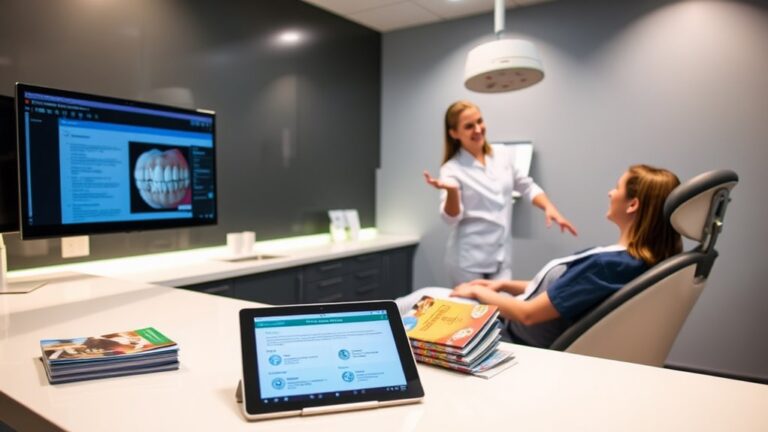Dental Scheduling Software: Boost Efficiency and Patient Care
Imagine your practice managing appointments for over 100 patients a week without the chaos of missed calls or double bookings. With dental scheduling software, you can streamline appointment management and greatly enhance patient care. This technology not only automates reminders but also allows online booking, reducing no-show rates and improving overall satisfaction. But what specific features should you consider to truly transform your workflow and patient engagement? Let's explore how these tools can redefine your practice.
If you need assistance in selecting the right dental scheduling software or have questions about optimizing your practice, feel free to contact us. We can connect you with experts who can provide tailored solutions to meet your needs.
Benefits of Dental Scheduling Software
Dental scheduling software transforms the way dental practices manage appointments, leading to considerable improvements in efficiency and patient satisfaction. By automating appointment scheduling and management, you reduce administrative overhead and cut down on time spent on phone calls and paperwork. This allows your staff to focus more on what truly matters: providing excellent patient care.
With features that integrate popular communication tools, you can automate the booking process and reduce patient no-show rates by up to 35%. Offering online scheduling simplifies appointment booking for patients and greatly reduces their wait times. They can also modify, reschedule, or cancel appointments online, guaranteeing appointment flexibility that caters to their busy lives. Additionally, the implementation of automated reminders via SMS, email, or phone helps patients remember their appointments, further enhancing their experience. By customizing appointment types, you guarantee that patients select the right services tailored to their needs.
This level of convenience and responsiveness not only elevates patient satisfaction but also fosters lasting relationships built on trust and care. In a world where patient-centric practices thrive, dental scheduling software is your partner in achieving these goals.
Key Features to Consider
When selecting dental scheduling software, it's important to focus on the features that will best support your practice's workflow and enhance patient interactions. Look for customizable scheduling options that allow you to adjust appointment times based on specific procedures. This guarantees your schedule remains balanced and efficient, ultimately benefiting both staff and patients.
Advanced scheduling tools, such as drag-and-drop functionality and real-time availability, make managing appointments a breeze. Additionally, online appointment booking empowers patients to schedule, change, or cancel their visits conveniently, promoting a patient-centric approach. Furthermore, the integration of EHR and EMR systems allows for seamless access to patient records, enhancing scheduling accuracy.
Another critical feature is automated reminders. This tool sends personalized notifications to patients via SMS, email, or phone, greatly reducing no-shows and cancellations. By keeping patients informed, you can foster a more reliable appointment system.
Real-time syncing with your practice management software guarantees that your schedule is always up-to-date, preventing any conflicts.
Together, these features create an organized, efficient scheduling environment that prioritizes patient care while streamlining operations. Investing in software that incorporates these elements can truly boost your practice's productivity and patient satisfaction.
Enhancing Patient Engagement
Engaging patients effectively is essential for building a thriving dental practice. By enhancing patient communication through automated reminders via text, email, and phone calls, you can keep patients informed about upcoming appointments and follow-up care, greatly reducing no-show rates.
These appointment reminders not only help patients remember their visits, but they also allow for immediate confirmation, improving overall satisfaction. Furthermore, integrating messaging features enables patients to communicate easily with your office regarding treatment plans or last-minute changes, fostering a sense of involvement in their care.
Online scheduling tools empower patients to book, modify, or cancel appointments at their convenience, enhancing their engagement. Additionally, the use of robust engagement features further ensures that patients feel connected to your practice.
To deepen the connection, consider sending personalized messages for birthdays or special promotions, which builds loyalty among patients. Automated follow-up messages thanking patients for their visits and encouraging feedback guarantee they feel valued.
Streamlining Appointment Management
Streamlining appointment management is vital for maximizing efficiency in your practice. By implementing customizable scheduling, you can tailor appointment times based on specific procedures, guaranteeing adequate time is allocated for each treatment. This allows you to optimize your schedule, accommodating high-demand services during peak hours while reserving longer procedures for quieter times.
Real-time scheduling enhances appointment flexibility, letting patients book their visits directly from available time slots. This transparency not only builds trust but also reduces unnecessary communication, making sure everyone knows the current schedule. Additionally, the ability to display schedule availability ensures patients can see when they can book their appointments with ease.
Automated reminders and notifications play a key role in minimizing no-shows and cancellations, keeping your patients informed and engaged while aiding your team in managing arrivals and changes effectively.
Integration with practice management systems allows you to connect multiple office locations, streamlining the booking process across all branches. By syncing internal schedules, you can prevent scheduling conflicts and guarantee a balanced workload.
Integrating Patient Records
Integrating patient records into your dental practice enhances both operational efficiency and the quality of care you provide. By utilizing practice management systems like Dolphin and OrthoBridge, you can streamline patient record management with effective data synchronization.
This integration allows you to create and update patient profiles directly within these systems, guaranteeing you access essential patient data effortlessly.
With real-time syncing, you'll always have accurate and up-to-date patient information at your fingertips. This feature not only facilitates seamless appointment scheduling but also reduces errors by eliminating the need for manual updates. Additionally, enhanced efficiency in patient management can significantly improve patient outcomes.
By automating data entry, you can focus more on delivering exceptional care rather than getting bogged down by administrative tasks.
Furthermore, you can manage monitoring processes and patient treatment plans from a unified platform. Digital conveniences, such as automated reminders and online forms, enhance patient engagement and streamline workflows.
Thorough patient information management guarantees that you're prepared for each visit, enhancing both communication among staff and coordination of care.
Ultimately, integrating patient records transforms your practice into a more efficient, patient-focused environment that prioritizes exceptional care delivery.
Improving Billing Processes
In the domain of modern dentistry, enhancing billing processes is vital for optimizing both practice efficiency and patient satisfaction. By adopting automated invoicing systems, you can streamline repetitive tasks like claim submission and payment posting, which cuts down on errors and accelerates your revenue cycle. This means you could reduce your weekly billing time considerably, allowing your team to focus more on patient care.
Moreover, providing financial transparency is essential for fostering trust with your patients. Clear communication regarding insurance coverage and out-of-pocket costs can greatly enhance their experience. Automated systems generate clear billing statements and timely payment receipts, making sure patients are well-informed about their billing and insurance status, minimizing misunderstandings. Additionally, real-time eligibility checks help ensure accurate patient payment collection, reducing the time spent on insurance-related inquiries.
Expanding payment options is another key element. Offering various methods—like credit cards, bank transfers, or mobile payments—makes it easier for patients to settle their accounts.
Automated payment reminders sent via text or email can help guarantee timely collections while enhancing transaction security.
Optimizing Clinical Documentation
While improving billing processes is important for practice efficiency, optimizing clinical documentation plays a pivotal role in enhancing patient care and outcomes. By implementing digital documentation tools, you can guarantee accurate and efficient recording of patient visits, markedly reducing errors associated with handwritten notes. This allows you quick access to patient histories and treatment plans, facilitating better decision-making.
Moreover, modern treatment planning software provides treatment visualization through 3D modeling, helping patients understand their options clearly. This visual aid encourages patient engagement and fosters a collaborative approach to care.
Integrating your digital documentation with diagnostic equipment means patient images, like X-rays, are seamlessly linked to their records, enhancing diagnostic accuracy and streamlining your workflow. Additionally, with 80% of patients preferring online appointment booking, optimizing clinical documentation becomes even more critical as it aligns with patient expectations for seamless interactions.
Tracking patient progress becomes easier with automated reminders for follow-up appointments, assuring continuity of care. By utilizing these digital tools, you empower your patients with personalized treatment plans and educational resources, ultimately leading to improved compliance and satisfaction.
Optimizing clinical documentation, consequently, not only boosts your practice's efficiency but also greatly enhances the quality of care you provide, making a lasting impact on your patients' lives.
Ensuring Data Security and Compliance
Guaranteeing data security and compliance is crucial for safeguarding patient information and maintaining trust in your practice. You must prioritize the protection of sensitive data while adhering to regulations like HIPAA.
Here are four key steps to enhance your security measures:
- Data Encryption: Confirm all patient data is encrypted both in transit and at rest, protecting it from unauthorized access.
- Access Controls: Implement strict access controls to ensure that only authorized personnel can view patient information, thereby minimizing risk.
- Regular Updates: Keep your dental scheduling software updated to comply with the latest security best practices and protect against vulnerabilities.
- Audit Trails: Maintain thorough audit logs to track who accesses patient data and what changes are made, guaranteeing accountability.
Additionally, provide staff training on HIPAA compliance and establish policies for breach notifications.
By focusing on these areas, you'll not only enhance the security of your patient data but also foster a culture of trust and reliability in your practice.
Prioritizing data security and compliance is a crucial step toward delivering exceptional patient care.
Frequently Asked Questions
How Does Scheduling Software Affect Staff Workload?
Scheduling software greatly reduces your staff's workload by automating tasks, which enhances staff productivity and leads to improved patient satisfaction. It streamlines operations, allowing your team to focus more on providing exceptional patient care.
Can Scheduling Software Integrate With Other Dental Practice Tools?
They say, "A stitch in time saves nine." Scheduling software can indeed integrate with various dental tools, enhancing scheduling benefits while addressing integration challenges, ultimately streamlining operations and improving patient care for your practice.
What Is the Average Cost of Dental Scheduling Software?
The average cost of dental scheduling software varies greatly, with pricing models ranging from $109 to $250 monthly. By examining software comparisons, you can find a solution that best fits your practice's needs and budget.
Is Training Required for Staff to Use the Software?
Yes, training's essential for enhancing user experience. Various training methods, including remote setup, in-office sessions, and online tutorials, guarantee your staff masters the software, ultimately improving patient care and operational efficiency in your practice.
How Often Is Software Updated and Maintained?
Did you know regular software updates can reduce security risks by up to 90%? You should follow a maintenance schedule that includes daily checks, weekly updates, and monthly reviews to guarantee peak performance and security.
Conclusion
Incorporating dental scheduling software is like finding the perfect key for a lock—you unlock efficiency and enhance patient care. By streamlining appointment management and improving communication, you create a smoother experience for both your staff and patients. With features that engage patients and safeguard their information, you're not just organizing schedules; you're fostering trust and satisfaction.
If you're navigating challenges with scheduling or looking to optimize your practice, don't hesitate to reach out to us for assistance. Our expert help can save you time, reduce stress, and significantly improve your dental practice. Embrace this technology, and watch your practice thrive as you focus on what truly matters: delivering exceptional care to your patients.





